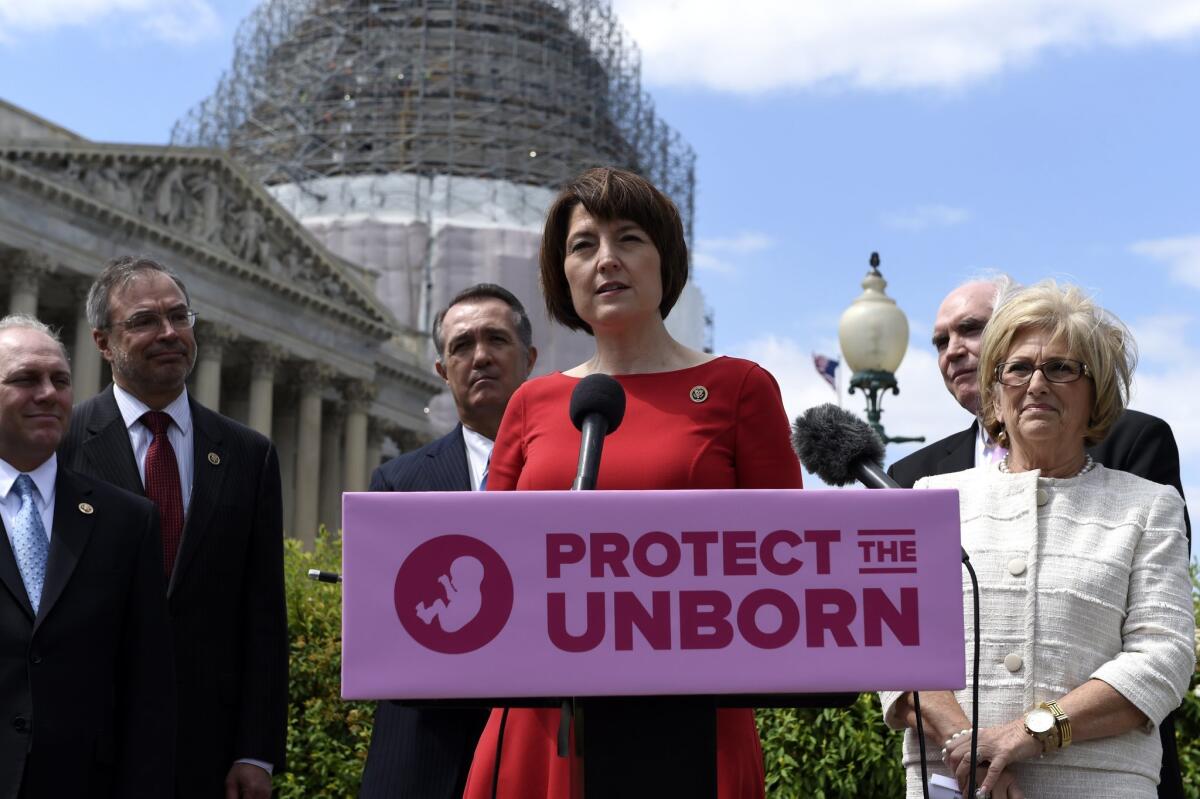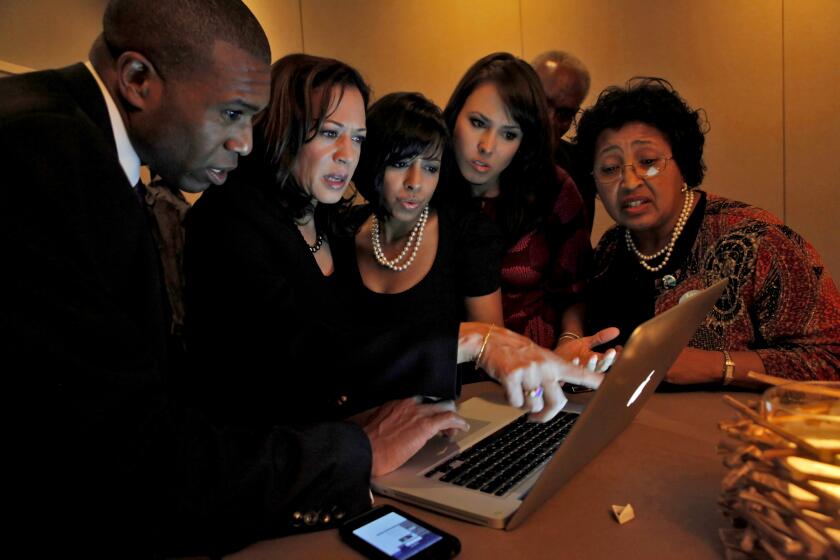Op-Ed: Why adding family leave could save the GOP’s bill to ban abortion after 20 weeks

Rep. Cathy McMorris Rodgers (R-Wash.) speaks during a news conference on May 13 about the Pain-Capable Unborn Child Protection Act.
A GOP-sponsored bill — the Pain-Capable Unborn Child Protection Act — which would ban abortion beyond 20 weeks except in cases of rape or when the life of the mother is at risk, has already passed in the House of Representatives. The Senate is expected to vote on it this month, perhaps timed to coincide with the arrival in the U.S. of Pope Francis. The act ought to be a shoe-in: According to a 2013 Washington Post-ABC News poll 64% of Americans support restricting abortion beyond 20 weeks. Perhaps counterintuitively, women are more likely to support it than men, and younger people more than older people.
But even with such poll numbers, the bill as it stands isn’t likely to pass. Republicans need a handful of moderate Democrats to buck their party’s pro-choice orthodoxy. And what are they doing to get those moderates on board? Not much.
There is nothing in this bill, for instance, that could give moderate Democrats enough cover from their pro-choice extremist leadership to allow them to vote for it, and the Republicans have made no proposals to amend it. Indeed, despite the GOP’s reputation as the pro-life party, its leaders may very well not want this bill to pass.
Consider that each time such popular legislation fails Republicans get a windfall in pro-life money, votes and ground game for the next election cycle. They get a ready-made way to attack the other party. In a word, they get anger. The kind of anger that can fire up their base during campaign season.
It may not work this time around, however. Hard-core pro-lifers — people who are more interested in changing abortion laws than maintaining political wedge issues — are beginning to realize they’ve gained precious little from supporting national Republican candidates over the last four decades. In an opinion piece for the Week, Pascal-Emmanuel Gobry pointed out why pro-lifers should be hesitant to trust Republicans:
“The GOP’s elite (particularly its donor class and its consultant class) tend to be overwhelmingly pro-choice and socially liberal. Those groups not only disagree with pro-lifers, but a great number of them tend to view the pro-life cause with outright contempt. With noteworthy exceptions, the elite of the GOP snickers at us behind our backs even as it feels forced to genuflect.”
Such a strategy actually fits well with the small-government heart of the Republican Party. Indeed, it is Democrats who tend to believe that government protection and support of the vulnerable should often trump the autonomy and privacy of the individual.
Perhaps it is not surprising, then, that the national advocacy group Democrats for Life has proposed a plan to pass the Pain-Capable Act rather than to merely exploit it politically. It is asking pro-lifers and moderate pro-choicers to protect and support both mother and child. In addition to a 20-week abortion ban, it supports an amendment to the legislation or a separate bill that would provide social support for women in the form of mandatory paid family leave.
This is the ultimate common-sense proposal. Based on U.N. data, the United States is the only industrialized country without some kind of paid family leave. According to both abortion foes and those who are pro-choice, it is one of only seven nations that permit abortion on demand beyond 20 weeks.
Pro-life groups that are closely tied to the Republican Party, however, are skeptical of the plan. Marjorie Dannenfelser, of the Susan B. Anthony List, which works to elect anti-abortion candidates, said that adding family leave “would be a good way to kill the bill.”
But without support from moderate Democrats the bill is already dead. Adding paid family leave is not only the right thing to do for women, it is most likely the only way to attract enough votes to revive it.
It may also be the only way the bill would pass Supreme Court muster. If the Pain-Capable Act passes there will almost certainly be a legal challenge, and Justice Anthony Kennedy, the swing vote on the court, will ask if it imposes an “undue burden” on women. He will be far more likely to decide it doesn’t if the law’s burdens are mitigated by increased social support. Perhaps this is why the Democrats for Life proposal (#ChooseBoth) has the full support of such serious pro-life groups as the Southern Baptist Convention and the National Assn. of Evangelicals. The U.S. Conference of Catholic Bishops has also signaled a willingness to support the mother and child approach.
Democrats for Life is urging its party leaders to make more room under their Big Tent for pro-lifers. Polls show that Latinos and millennials tend to be pro-life but they also have little sympathy for the GOP. If Republicans aren’t careful, the coming years may see its once-reliable pro-life forces dwindle, a devastating political prospect.
The Choose Both approach represents a way forward for Republicans and Democrats on a supremely divisive issue just as the 2016 campaigns kick into a new post-summer gear. With undercover videos forcing debate on Planned Parenthood’s funding, and with Ohio considering a ban on abortion in cases of Down’s syndrome, the Pain-Capable Act is an important test of Congress’ ability to make progress rather than play politics. How will Washington, and especially the Republicans, use this moment?
Charles C. Camosy, associate professor of Christian ethics at Fordham University and board member of Democrats for Life, is the author of “Beyond the Abortion Wars: A Way Forward for a New Generation.”
Twitter: @nohiddenmagenta
Follow the Opinion section on Twitter @latimesopinion and Facebook
More to Read
A cure for the common opinion
Get thought-provoking perspectives with our weekly newsletter.
You may occasionally receive promotional content from the Los Angeles Times.






